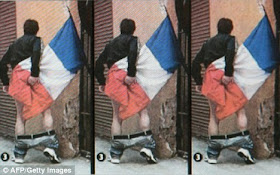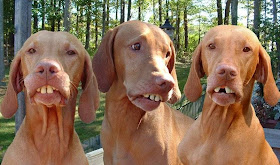
We are not here to mourn the white supremacist Eugene Terreblanche, whose funeral took place yesterday, but since his name is on the world's lips, let's face the truth: the saddest thing about his murder last weekend is that it obscured an event that casts an infinitely darker shadow.
The event took place in Zimbabwe, and involved, as fate would have it, Julius Malema, the ANC Youth League leader whose repeated singing of an old struggle song about shooting Boers is viewed by many Afrikaners as an incitement towards precisely the sort of violence that claimed Terreblanche's life. Even as an iron bar shattered the old right-winger's skull, Malema was in Harare, feasting with Robert Mugabe and picking up tips on how best to destroy the teetering remnants of Western influence here in South Africa. Terreblanche's murder was an individual tragedy. Malema's actions threaten to destroy an entire subcontinent.
Malema openly professes dislike for "children of the colonialists", a term he insists is not synonymous with white people. At other times, he says he doesn't hate white people, just the quality of "whiteness". In Malema's circle, this sort of juvenile wordplay passes as intellectuality. His utterances are often buffoonish, his politics a mix of crude populism and sinister racial demagoguery.
Malema is the vulgarian who dismissed the woman who laid a rape charge against Zuma as a slut, arguing that any female who stays for breakfast in rape's aftermath "clearly enjoyed herself". He levelled similar slurs at Opposition leader Helen Zille, calling her "a racist little girl" who slept with all her male colleagues. In every case, he seemed to relish the resulting outrage, especially if it came from whites. But this was a sideshow. In South Africa, the real struggle is the struggle between rival ANC factions, eager for power and its spoils. It is in this arena that Malema's behaviour acquires a disturbing cast.
When Jacob Zuma came to power a year ago, most observers were expecting a sharp turn Leftward, but the Zulu patriarch was at pains to allay such concerns. He toured the UK and Europe, assuring financiers that their investments were safe in South Africa. A few months later, Malema begged to differ: nationalisation is very much on the cards, he said. Zuma's minister of mines, Susan Shabangu, issued a stern reprimand, saying that South Africa's minerals would never be nationalised "in my lifetime". Malema just laughed, accusing Shabangu of "sucking up to monopoly capital" and hinting she would soon be out of a job.
In African culture, it is shameful to address one's elders in this manner, but Malema got away with it. Emboldened, he took to excoriating his superiors for placing key economic ministries in the hands of whites and Indians. Then he picked a fight with cabinet minister Jeremy Cronin, South Africa's most visible white Communist, who had dared to opine that his enthusiasm for nationalisation had much to do with a fondness for bling and nothing to do with the plight of the poor. In response, Malema reportedly sent Cronin a threatening SMS: "Wait to see what's coming to you."
Alarm was mounting, but Malema appeared untouchable. Two weeks ago, he made an extraordinary speech at the wedding of Robert Gumede, an IT entrepreneur grown rich off government contracts. Grinning malevolently, Malema warned Gumede that the masses were coming to take his money away. Billionaire Patrice Motsepe and ANC treasurer Mathews Phosa were told to expect a similar fate. Zola Skweyiya, South Africa's high commissioner in the UK, was mocked as a coward who had become "scared" of foreign capitalists. "Skweyiya is telling investors in London that nationalisation of mines will not happen," said Malema. The youth leader clearly had other ideas.
Insulting a man of Skweyiya's stature is an unspeakable violation of African etiquette. Malema's utterances were also an outrageous violation of his party's standing policy on nationalisation. I assumed the ANC's elders now had no choice other than to put him firmly in his place. I was wrong. No one said a word.
It was against this backdrop that Malema set forth for Zimbabwe last weekend. In the past, he has always hewed to the ANC line: Mugabe's disastrous policies will not be emulated in South Africa. The rule of law will be upheld, the constitution respected. There will be no land invasions, no nationalisation of mines or businesses.
But something has clearly changed. On his trip to Harare, Malema was met at the airport by a clutch of notorious profiteers whose connection to the great dictator enabled them to grow rich even as their country died. These "vultures" are said to be slavering at the prospect of another killing as Mugabe moves to dismember Zimbabwe's last surviving businesses and mines in the name of "indigenisation".
By all accounts, Malema was thrilled to make their acquaintance. They organised a crowd to sing his controversial song about shooting Boers. Then they whisked him off in a presidential Mercedes Benz and put him up in Harare's most expensive hotel. In return, Malema expressed his unqualified admiration for the policies that have ruined Zimbabwe and vowed to press for their adoption south of the Limpopo River.
"In South Africa, we are just starting," said Malema. "Here you are already very far. We are very happy today that you can account for more than 300,000 new farmers, against the 4,000 who used to dominate agriculture. We hear you are now going straight to the mines. That's what we are going to be doing in South Africa. We want the mines. They have been exploiting our minerals for a long time. Now it's our turn also to enjoy from those minerals…"
On Thursday, Malema reiterated these sentiments at a press conference marked by an ugly racial attack on a BBC reporter. There has been no repudiation. The silence says something truly ominous: Malema has protection. Someone in the ANC – either the president himself, or an awesomely powerful faction inside the party – is encouraging him to rally the masses for a Zimbabwe-style obliteration of Africa's only viable economy and last surviving hope.
I thought that only the South African Communist Party (SACP) was capable of irrationality on such a dumbfounding scale. I was wrong. Malema is not a tool of the SACP. In fact, he's at constant odds with the SACP's leadership. The other day he even resurrected Pretoria's old Red Menace theory, accusing "yellow Communists" – a veiled reference to Indians in the party's leadership – of plotting to control the ANC by secret means. Anyone who voices such painful truths cannot possibly be an ally of the SACP.
Besides, the Reds are fairly sophisticated, whereas Malema's every utterance is a cringe-inducing embarrassment. Listen to him in Harare last Saturday: "They are so bright, so colourful, we refer to them as white people. Maybe their colour came as a result of exploiting our minerals and perhaps if some of us get opportunities in these minerals we can develop a nice colour like them." This is not a coldly scientific Marxist-Leninist. It's Pere Ubu or Idi Amin.
It could be that President Zuma has simply lost control of the ANC, or that Malema is the puppet he uses to mouth ideas too radical to emerge from the presidency. If you ask me, Malema is the point-man for a powerful ANC faction whose motive is greed and whose chosen weapon is racial demagoguery of the most primitive kind.
The trouble is that this card trumps all others. Our underclass is huge, poorly educated and desperately poor. They know what happened in Zimbabwe, but even so, the prospect of loot is irresistible, and that's Malema's bait. Mandela gave them free houses. Mbeki gave them welfare grants, leading to a situation where five million taxpayers support 13 million indigents, with the total rising far more rapidly than our ability to pay. Now Malema and the faceless vultures behind him are offering them the rest. They are playing the death card, the Ace of Spades.
Te morituri salutant.
http://www.telegraph.co.uk/news/worldnews/africaandindianocean/southafrica/7572374/The-man-playing-South-Africas-death-card.html










 THE WORST IN LIFE IS "ATTACHMENT " IT HURTS WHEN YOU LOSE IT.
THE WORST IN LIFE IS "ATTACHMENT " IT HURTS WHEN YOU LOSE IT.





























